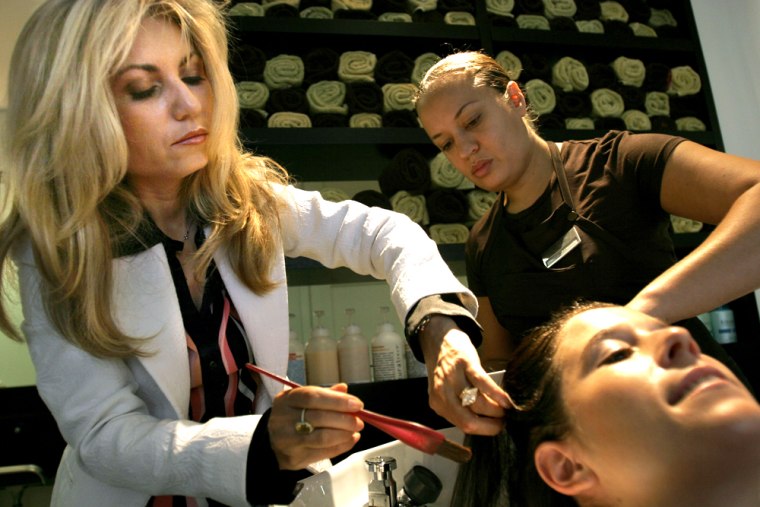The story of how Cornelia Zicu came to start a Fifth Avenue spa and the story of Abdul Wadud training his cousin to sell fruit on a corner across from Madison Square Garden are stories as old as immigration in America.
Just as some neighborhoods have a concentration of people from one country, so do some jobs, as one family member brings others from the old country and helps them find work.
For instance, Indians and their descendants own 50 percent of the nation’s economy lodging properties, 1 million rooms in all, according to their trade group, the Asian-American Hotel Owners Association. Roughly 39 percent of the country’s manicurists are Vietnamese, according to the trade magazine “Nails,” although Manhattan women know the city’s nail trade is dominated by Koreans.
The tradition goes back to the waves of immigration in the 1800s. Louis DiPalo, who works at a cheese store in New York’s Little Italy started by his great grandfather, talks about how almost everyone in the first generation of his family who came to America opened a cheese store of their own in the same neighborhood.
“They weren’t competing,” he said. “They were making a marketplace.”
In New York City now, almost all the street vendors selling handbags and watches are Senegalese, said Sean Basinski, head of the street vendor project at the Urban Justice Center, which provides legal assistance to vendors.
“I challenge you to find a Senegalese selling fruit,” he said. “The Bengalis sell fruit.”
New York’s coffee and bagel street vendors are usually Afghans, the fruit salad and smoothie vendors are usually Vietnamese, but the people selling mangos on a stick are usually Mexican, Basinski said.
Why?
“It’s just the efficient immigrant network,” Basinski said. “I guess it’s efficient. For them, it’s all they have. Most vendors are not in a position to be innovators. They’re just trying to make their rent and enough to send home to their families. They do what their friends and relatives do.”
Fruit vendor Abdul Wadud came to the U.S. from Bangladesh in 1984. He began selling fruit a couple years ago after he got his street vendor’s license. His cousin, Akim Siddiqur Rahman, 62, came to the U.S. six months ago and is helping Wadud while he tries to get his own license.
“I want to take care of the family,” Wadud said.
Social scientists have long debated whether immigrants start their own businesses because they want to determine their own futures or because others won’t hire them.
A 1997 report by the Carnegie Endowment said that in every decennial census from 1880 to 1980, immigrants in the United States were significantly more likely to be self-employed than people born here. Their businesses are often small scale, with low startup costs, the report said.
Hasmukh Rama, 57, certainly started that way. Rama was born to an Indian family living in Malawi in Africa. The family sent him to India for school, then, in 1969, he came to the United States with $2 in his pocket and an acceptance from the MBA program at Xavier University in Cincinnati, Ohio.
He started in the hotel business in Pomona, Calif. at age 25, at the urging of his maternal aunt’s husband.
“Most Indians are introduced that way,” he said. “They know some relative or friend already in the hotel business. They learn from each other, they help each other to locate the hotel or motel and they also help financially.”
He is now chairman and CEO of JHM Hotels, where his four brothers and a nephew also work. The company owns 32 hotels and has 1,000 employees.
“I learned on my first property after I bought the hotel,” he said. “I learned everything from making beds to cleaning the parking lot to making minor repairs to rending rooms.”
Cornelia Zicu, by contrast, knew what she would do after she fled Romania, which was then ruled by the dictator Nicolae Ceausescu. While living in an Austrian refugee camp from 1989, she cut hair and did women’s makeup.
“Every morning, I have one hour of beauty,” she said. “That was my technique, starting in dictator times, to transform the ugly face of life.”
Zicu came to the United States in 1992 with no money and no English. Her first job in the U.S. was washing stairs, but she says she knew it was temporary. She studied English and eventually became a facialist at the expensive Peninsula Hotel.
She built a dedicated clientele, one of whom is married to a successful real estate developer. Together, they opened a spa called Cornelia on swanky Fifth Avenue last year.
The 130 employees at the spa come from all over the world, but 35 are Romanian.
Why? Partly because they understand how she thinks. Romania has 22 million people and 230 resorts, she said. Even under Ceausescu, every Romanian got one free trip a year to a resort. The first thing teachers did in school when Zicu was a girl was examine the nails of every child in class.
“Maybe people didn’t have food, but every two weeks they got a manicure and pedicure,” Zicu said.
